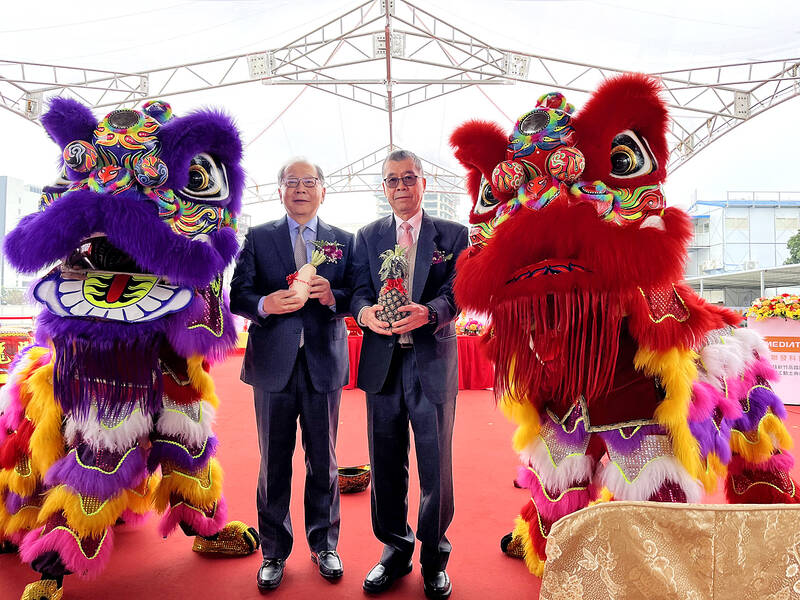MediaTek Inc (聯發科), the world’s biggest mobile phone chip supplier, yesterday said application-specific integrated circuits (ASIC) for artificial intelligence (AI)-enabled data centers and auto chips would be its dual revenue growth engines in next decade.
The Hsinchu-based chip designer made the remarks in response to a shareholder’s question about the company’s next growth drivers, given that the smartphone market is reaching a plateau.
“5G, AI and automotive are the areas with potential growth in next 10 years. AI covers a wide range of applications, from cloud to edge devices,” company chairman Tsai Ming-kai (蔡明介) said during an annual general meeting yesterday.

Photo: Liao Hsueh-ju, Taipei Times
“MediaTek has been developing products for mobile phones and various applications mostly for edge devices,” Tsai said.
It would be natural for the firm to shift to AI-powered cloud computing devices and automotive applications, given its rich intellectual property portfolios, he said.
“The revenue contribution is still small. We are making smooth progress,” Tsai said.
Mobile phone chips were the biggest revenue contributor in the last quarter, making up 60 percent of the company’s total revenue.
MediaTek earlier this year introduced its first automotive chip portfolio, dubbed Dimensity Auto Cockpit, which runs large language models, allowing vehicles to support chatbots, rich content delivery to multiple displays, driver alertness detection, and other AI-based safety and entertainment applications.
The Dimensity Auto Cockpit chipsets integrate a state-of-the-art Armv9-A system, Nvidia’s next-generation deep learning accelerator with generative AI capabilities, as well as Nvidia RTX graphics, MediaTek said.
Aside from the automotive segment, MediaTek has been heavily investing in the development of ASIC and Arm computing, company CEO Rick Tsai (蔡力行) told shareholders.
They have “high confidence” that those new technologies would yield plenty of growth in the next three to five years, he said.
The company also said it wanted to tap into the rapidly-growing market of AI ASIC accelerators for data centers, which is estimated to grow from US$12 billion this year to US$40 billion by 2028.
MediaTek is vying for a 10 percent market share, it told investors last month.
It also aims to continue growing revenue at an annual pace of 15 percent this year, on the back of a recovery from an inventory correction cycle post-COVID-19 pandemic and strong uptake of its flagship smartphone chips.
Customers started rebuilding smartphone chip inventory early this year, after reducing inventory to a very low level at the end of last year, Tsai said.
However, customers’ restocking demand has come to an end this quarter, he said, adding that their inventory has reached a “balance.”
MediaTek’s shareholders yesterday approved the distribution of a cash dividend of NT$26.4 per share, based on the first half of last year’s earnings of NT$20.71 per share, and another cash dividend of NT$30.4 a share for the second half, based on its EPS of NT$27.79.
Shareholders also approved the board director nominations of Tsai Ming-kai, Rick Tsai and chief operating officer Joe Chen (陳冠州).
A majority of the nominees are existing directors, except Chang Yao-wen (張耀文), dean of the College of Electrical Engineering and Computer Science at National Taiwan University.
Chang replaced Tang Ming-je (湯明哲) as an independent director.

SEEKING CLARITY: Washington should not adopt measures that create uncertainties for ‘existing semiconductor investments,’ TSMC said referring to its US$165 billion in the US Taiwan Semiconductor Manufacturing Co (TSMC, 台積電) told the US that any future tariffs on Taiwanese semiconductors could reduce demand for chips and derail its pledge to increase its investment in Arizona. “New import restrictions could jeopardize current US leadership in the competitive technology industry and create uncertainties for many committed semiconductor capital projects in the US, including TSMC Arizona’s significant investment plan in Phoenix,” the chipmaker wrote in a letter to the US Department of Commerce. TSMC issued the warning in response to a solicitation for comments by the department on a possible tariff on semiconductor imports by US President Donald Trump’s

‘FAILED EXPORT CONTROLS’: Jensen Huang said that Washington should maximize the speed of AI diffusion, because not doing so would give competitors an advantage Nvidia Corp cofounder and chief executive officer Jensen Huang (黃仁勳) yesterday criticized the US government’s restrictions on exports of artificial intelligence (AI) chips to China, saying that the policy was a failure and would only spur China to accelerate AI development. The export controls gave China the spirit, motivation and government support to accelerate AI development, Huang told reporters at the Computex trade show in Taipei. The competition in China is already intense, given its strong software capabilities, extensive technology ecosystems and work efficiency, he said. “All in all, the export controls were a failure. The facts would suggest it,” he said. “The US

The government has launched a three-pronged strategy to attract local and international talent, aiming to position Taiwan as a new global hub following Nvidia Corp’s announcement that it has chosen Taipei as the site of its Taiwan headquarters. Nvidia cofounder and CEO Jensen Huang (黃仁勳) on Monday last week announced during his keynote speech at the Computex trade show in Taipei that the Nvidia Constellation, the company’s planned Taiwan headquarters, would be located in the Beitou-Shilin Technology Park (北投士林科技園區) in Taipei. Huang’s decision to establish a base in Taiwan is “primarily due to Taiwan’s talent pool and its strength in the semiconductor

French President Emmanuel Macron has expressed gratitude to Hon Hai Precision Industry Co (鴻海精密) for its plan to invest approximately 250 million euros (US$278 million) in a joint venture in France focused on the semiconductor and space industries. On his official X account on Tuesday, Macron thanked Hon Hai, also known globally as Foxconn Technology Group (富士康科技集團), for its investment projects announced at Choose France, a flagship economic summit held on Monday to attract foreign investment. In the post, Macron included a GIF displaying the national flag of the Republic of China (Taiwan), as he did for other foreign investors, including China-based